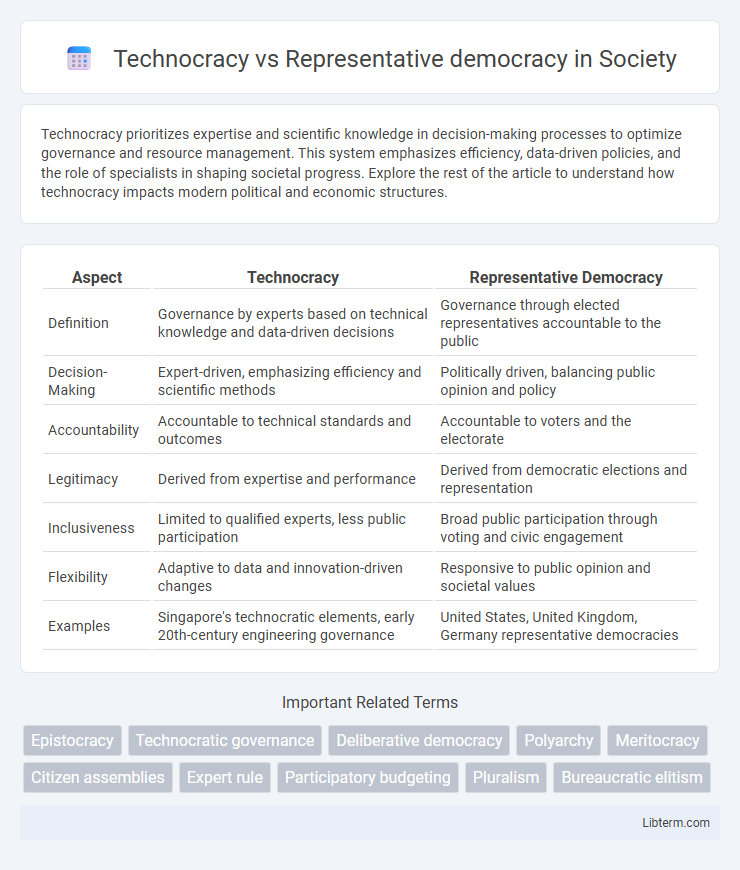Technocracy prioritizes expertise and scientific knowledge in decision-making processes to optimize governance and resource management. This system emphasizes efficiency, data-driven policies, and the role of specialists in shaping societal progress. Explore the rest of the article to understand how technocracy impacts modern political and economic structures.
Table of Comparison
| Aspect | Technocracy | Representative Democracy |
|---|---|---|
| Definition | Governance by experts based on technical knowledge and data-driven decisions | Governance through elected representatives accountable to the public |
| Decision-Making | Expert-driven, emphasizing efficiency and scientific methods | Politically driven, balancing public opinion and policy |
| Accountability | Accountable to technical standards and outcomes | Accountable to voters and the electorate |
| Legitimacy | Derived from expertise and performance | Derived from democratic elections and representation |
| Inclusiveness | Limited to qualified experts, less public participation | Broad public participation through voting and civic engagement |
| Flexibility | Adaptive to data and innovation-driven changes | Responsive to public opinion and societal values |
| Examples | Singapore's technocratic elements, early 20th-century engineering governance | United States, United Kingdom, Germany representative democracies |
Defining Technocracy and Representative Democracy
Technocracy is a system of governance where decision-makers are selected based on their expertise in specialized fields, emphasizing technical knowledge and scientific principles over political considerations. Representative democracy operates through elected officials who represent the interests of the populace, making policy decisions on behalf of citizens within a framework of voting and political accountability. Both systems prioritize different approaches to governance: technocracy values efficiency and expert-driven policy, while representative democracy underscores public participation and electoral legitimacy.
Historical Development of Both Systems
Technocracy emerged in the early 20th century as an approach advocating for decision-making by experts and engineers, especially during the industrialization and scientific advancement periods. Representative democracy, with roots tracing back to Ancient Greece and Rome, evolved through the Enlightenment era and solidified in the 18th and 19th centuries with the rise of modern nation-states and constitutional frameworks. Both systems developed in response to demands for efficient governance, but technocracy emphasizes specialized knowledge while representative democracy prioritizes electoral accountability and citizen participation.
Core Principles and Ideals
Technocracy centers on governance by experts and technical specialists, emphasizing decision-making based on data, efficiency, and scientific knowledge to optimize societal outcomes. Representative democracy prioritizes elected officials symbolizing the popular will, upholding principles of political participation, accountability, and protection of individual rights. The core ideal of technocracy lies in rational administration and expertise-driven policy, whereas representative democracy values legitimacy through citizen consent and pluralism.
Governance Structures and Decision-Making
Technocracy emphasizes governance by experts and specialists who use technical knowledge and data-driven analysis to inform decision-making processes, often prioritizing efficiency and long-term outcomes. Representative democracy relies on elected officials acting as proxies for the population, balancing diverse interests and values through political negotiation and majority rule. Governance in technocracy tends to be centralized and specialized, while representative democracy features broader participation and accountability through periodic elections.
Role of Expertise vs. Public Participation
Technocracy emphasizes governance by experts with specialized knowledge, prioritizing technical efficiency and informed decision-making in policy formulation. Representative democracy values widespread public participation, allowing elected officials to reflect the diverse interests and preferences of the electorate. The core tension lies in balancing expert-driven solutions against inclusive, participatory legitimacy in political systems.
Accountability Mechanisms
Accountability mechanisms in technocracy center around expert oversight and performance metrics, ensuring decisions are made based on specialized knowledge and efficiency. Representative democracy relies on electoral processes and institutional checks and balances, allowing citizens to hold elected officials accountable through voting and legislative scrutiny. The transparency of technocratic governance may be limited compared to the participatory nature of representative democracy, impacting public engagement and responsiveness.
Impact on Policy Outcomes
Technocracy emphasizes decision-making by experts with specialized knowledge, leading to more technically sound and efficient policy outcomes, particularly in complex sectors like healthcare and infrastructure. Representative democracy ensures policies reflect broader public interests and values, though it may result in slower decision-making and potential compromises due to diverse political pressures. The impact on policy outcomes varies as technocracy prioritizes expertise-driven results, while representative democracy balances expertise with electoral accountability and public participation.
Societal Benefits and Drawbacks
Technocracy offers societal benefits through data-driven decision-making and expert governance, potentially increasing policy efficiency and problem-solving precision. However, it may reduce public participation and accountability, leading to elitism and a disconnect from citizens' diverse needs. Representative democracy promotes inclusivity and responsiveness to public opinion but can suffer from slower decision processes and susceptibility to political polarization or populism.
Contemporary Examples Around the World
Technocracy emphasizes governance by experts and technical specialists, with Singapore often cited as a prime example due to its meritocratic leadership and data-driven policies. In contrast, representative democracy is exemplified by countries like the United States, where elected officials make decisions reflecting the electorate's diverse views. Hybrid models also exist, such as China's technocratic Communist Party leadership combined with non-competitive electoral elements, blending expert governance with limited representation.
Future Prospects and Challenges
Technocracy emphasizes decision-making by experts, promising enhanced efficiency and data-driven policy outcomes, especially in managing complex technological challenges like climate change and artificial intelligence governance. Representative democracy prioritizes citizen participation and accountability, yet faces challenges such as political polarization and misinformation that complicate future governance. Balancing technocratic expertise with democratic legitimacy remains a critical challenge for future political systems aiming to address complex societal problems while maintaining public trust.
Technocracy Infographic

 libterm.com
libterm.com